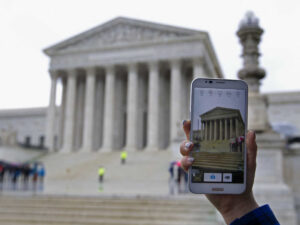What the Indiana Cell Phone Case Means for the Future of Privacy
The outcome of the State of Indiana cell phone case awaits a ruling from the State’s Supreme Court. Whether the Justices side with the State or defendant in Katelin Eunjoo Seo v. State of Indiana, the results will influence the future of privacy rights.

Although the digital revolution has been in progress for years, the legal system still struggles to apply traditional rights to technological situations. Since Ms. Seo came to Webster & Garino for representation when faced with criminal charges for stalking, attorney William Webster has argued that the demand from police for the passcode to her iPhone 7 smartphone represented a violation of her Fifth Amendment rights under the U.S. Constitution.
No Foregone Conclusion
The defendant chose to assert her Fifth Amendment rights and refused to supply the passcode to unlock her phone. The Trial Court declared her in contempt, but Mr. Webster successfully defended her before the Court of Appeals of Indiana. On appeal, the decision favored his view that forcing the defendant to tell the police her passcode served as testimony. To force people to reveal the contents of their minds ias the same as forcing people to testify against themselves. Mr. Webster argued that the “foregone conclusion” argument used by the State to circumvent Constitutional rights, did not apply because law enforcement could not say what they would find on the phone.
Both the U.S. and Indiana Constitutions protect people from being compelled by law enforcement to incriminate themselves. Mr. Webster maintains that protection from self-incrimination forms a necessary building block of a free society.
Freedom Or Hypothetical Threat
When the State challenged the Court of Appeals’ decision in defendant’s favor, the case advanced to the Supreme Court, and Mr. Webster presented his arguments again. The State’s attorneys warned that enabling people to withhold their phone passcodes from law enforcement would unleash a lawless society. In contrast, Mr. Webster hopes that the Supreme Court cell phone case will uphold a long tradition of protection from testifying against oneself instead of bending to fears about the hypothetical threat of a hamstrung law enforcement system.
The number of states that signed on to an Amicus Brief supporting the State’s position in the Indiana Cell Phone Case indicates its importance to governmental agencies. The American Civil Liberties Union also filed an Amicus Brief in support of Ms. Seo’s right to withhold her passcode to avoid self-incrimination.
A ruling that affirms Ms. Seo’s use of the Fifth Amendment could make the Supreme Court cell phone case a turning point in legal rights within a technological world. A decision based upon the alarmist arguments of law enforcement agencies that want unhindered access to personal information could significantly reduce people’s privacy and ability to protect personal information from prosecutorial scrutiny.
A solid estate plan is your family’s most valuable asset here’s why
